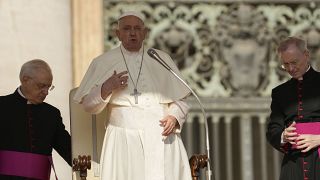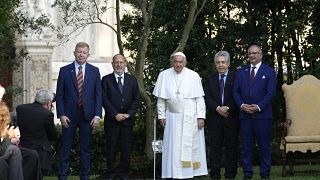Vatican
Pope Francis addressed ambassadors accredited to the Holy See on Monday, delivering a comprehensive overview of global challenges and the escalating violations of international humanitarian law.
He mentioned a plethora of ongoing worldly tribulations, such as the Israel-Hamas conflict, migration issues, climate crises, the immoral production of nuclear and conventional weapons, but also the complex socio-economical and political issues plaguing the African continent.
"Turning our gaze to Africa, we are witnessing the suffering of millions of people as a result of the numerous humanitarian crises that various sub-Saharan countries experience due to international terrorism, complex social political problems, and the devastating effects of climate change. Added to these are the effects of the military coups d’état that have occurred in several countries and certain electoral processes marked by corruption, intimidation and violence," said the Pontiff.
From Algeria to South Africa, a third of Africa is poised to participate in elections in 2024, with significant issues at stake in at least 18 countries entering an election year. Among these nations are Mali, Chad, and Burkina Faso, grappling with the aftermath of coups – provided the junta leaders in these countries adhere to their commitments.
“2024 will witness elections being held in many nations. Elections are an essential moment in the life of any country, since they allow all citizens responsibly to choose their leaders” he added.
In the coming year, the fate of several African economies hangs in the balance, as reported by various news outlets.
For some, the current debt crisis serves as a crucial turning point, offering a window of opportunity to enact substantial reforms and fortify fiscal resilience. Conversely, a larger contingent is anticipated to fall short, implementing only the essential reforms necessary to maintain financial support from entities like the IMF, the World Bank, and other donors.
The year ahead stands as a critical juncture for these economies, where strategic decisions will shape their trajectories in the post-debt crisis landscape.
While inflation is expected to see a general decrease in 2024, the long-term repercussions on households' purchasing power will persist. Additionally, countries reliant on food imports may face intensified challenges as currency depreciations contribute to the strain on household incomes.











Go to video
Archbishop of Canterbury will end official duties in early January amid sex abuse scandal
Go to video
Nairobi Archdiocese declines President Ruto's cash donation
Go to video
Ghana: Catholic Church takes stand against illegal mining also known as 'Galamsey'
01:08
Motorcyclists gather in their thousands at Fatima shrine for blessing of the helmets
01:04
Pope Francis in East Timor in first papal visit since independence
01:37
Burundi: Thousands of Pilgrims Gather at Mugera Marian Shrine